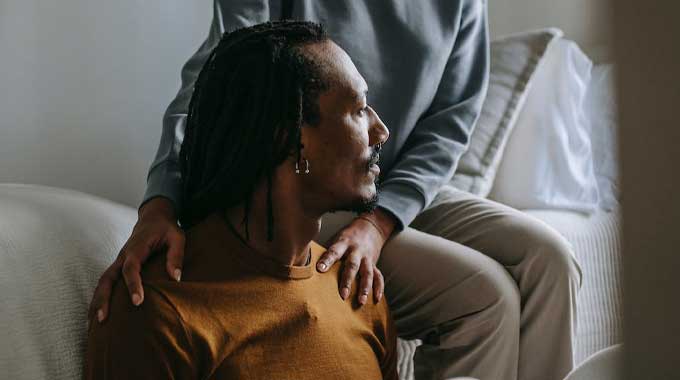Cocaine addiction follows a similar destructive path to all other addictions, but it is does have its own telltale signs. If you have a loved one who you believe may be addicted to cocaine or crack, read this.
This article will fill you in on the symptoms of cocaine addiction and everything you need to know to understand whether your loved one is addicted. It tells you what the warning signs are, and how you can get help for your loved one.
What is Cocaine Addiction?
Cocaine addiction is a serious, chronic issue that affects the brain and body. People who are addicted to cocaine cannot stop using the drug even though it causes them physical and psychological harm.
Cocaine addiction often starts with users taking the drug recreationally. They may have some lines of cocaine with friends on the weekend. For people with a propensity for addiction, this can escalate frequently into usage multiple days a week, and finally into every day use. Once someone is trapped in a cycle of addiction, it can be difficult for them to get out without assistance.
Get help: Addiction Treatment Orange County
How is Cocaine Used?
Cocaine is used in a number of different ways:
Snorting
This is the most common method of using cocaine. Users take the drug by sniffing the drug up through a straw, with a note or paper, or with a tube. When a user is snorting cocaine, the drug begins to kick in within about five minutes, and the high lasts for less than an hour.
Telltale signs of someone snorting cocaine include rolled up pieces of paper or notes or snorting tubes left around the house. If someone is taking cocaine in this way they may also leave surfaces with traces of cocaine residue and a bank card or piece of card for making lines of cocaine with.
Damage from cocaine use can often cause a running or bleeding nose as a result of damage. If someone takes cocaine in large amounts for a long period of time, they may start having chronic problems with their nose. Some users even lose the septum, which is the piece of skin between nostrils.
Smoking
Some users choose to smoke cocaine in crack form. A user may do this in a pipe, or mixed with tobacco in a cigarette. Some people smoke cocaine mixed with cannabis.
When users are smoking cocaine, they risk damage to their lungs. Someone who habitually smokes cocaine may have problems with their lungs.
Injecting
The most powerful way of taking cocaine powder is when a user injects the drug. Cocaine is usually injected intravenously. This causes a rapid onset, followed by a high lasting around twenty minutes.
Taking cocaine in this way is the most dangerous way to take cocaine. Users who do this risk collapsed blood vessels and other cardiovascular problems like heart attack. Injecting cocaine also increases the risk of overdose, and users who share needles may acquire diseases like HIV and hepatitis C.
How Does Cocaine Abuse Affect the Body?
Cocaine addiction takes a toll on the addict both psychologically and physically. The physical effects of cocaine addiction can be seen in the changes in sleeping and eating habits, as well as changes in appearance. The addict may look gaunt and tired, and their skin may be covered in sores from picking at it.
How Does Cocaine Affect the Brain?
Cocaine abuse alters the brain’s chemistry by interfering with the way nerve cells communicate. This interference causes the “high” that people feel when they use cocaine. With repeated use, this drug can cause changes in the brain that lead to addiction.
The psychological effects of cocaine addiction are often more subtle than the physical effects, but can be just as damaging. Addicts may become paranoid, anxious, or irritable. They may lose interest in activities that they once enjoyed, and their relationships with family and friends often suffer.
What Are the Signs of Cocaine Abuse?
The signs of cocaine abuse can vary depending on how much and how often someone uses cocaine. Some common signs include:
- Changes in sleeping or eating habits
- Mood swings
- Raised blood pressure
- Nervousness or paranoia
- Disinterest in hobbies or activities that were once enjoyed
- Financial problems
- Relationship problems
If you think your loved one may be addicted to cocaine, the best thing to do is to talk to them about it. If they are resistant to getting help, there are many resources available to help you convince them to seek treatment. Cocaine addiction is a serious disease that requires professional treatment. With the right help, your loved one can recover and lead a happy, healthy life.
Cocaine Withdrawal Symptoms
When someone stops using cocaine after a period of prolonged use, they may experience cocaine withdrawal symptoms. These include:
- Lethargy
- Depression
- Cravings for cocaine
- Sleeping for long periods of time
- Anxiety
Crack Cocaine Addiction
Crack cocaine (crack) is a preparation of cocaine that is mixed with baking soda or ether and made into rock form. Users take crack by either smoking or injecting.
The euphoric effects users experience from smoking crack is greater than that of snorting or smoking cocaine. Its duration is also shorter. These two factors mean that crack is even more addictive than cocaine.
Telltale signs of crack addiction include:
Asking for money: While crack typically comes in $10 rock, crack must be dosed repeatedly so that users do not experience a crash. If you know someone who is addicted to crack, they may repeatedly ask you to borrow money. They may also engage in risky behaviors so that they can get more crack.
Smoking paraphernalia: Crack is smoked using a pipe or a bong using copper wire. If you find one of these devices, this is an indication that the person may be smoking crack.
Erratic behavioral symptoms: People who smoke crack behave in unusual ways. They may be become aggressive or anxious or seem paranoid.
Cocaine Overdose
People who abuse cocaine repeatedly administer cocaine over a series of hours or even day. When cocaine is used in a compulsive fashion like this, cocaine overdose can happen easily. Overdose effects can come on rapidly, particularly when the drug is smoked or injected.
Physical symptoms of overdose after you abuse cocaine include:
- Excessive sweating
- Racing heart
- Irregular heartbeat
- Heart attack
- Chest pain
- Rapid breathing
- Coma
- Death
If you or a friend experience these physical symptoms, be sure to contact a hospital immediately.
Getting Treatment for Drug Abuse
Getting treatment for cocaine abuse follows a similar path to all substance abuse. Addiction treatment usually revolves around attending a treatment center for addiction. These centers help users:
Detox
The first thing that users do when they enter a treatment facility is stop taking the drug. This is followed by a period of withdrawal, which can be uncomfortable. Staff at the facility will make this safer and easier than a home detox. The detox period is when drug cravings are likely to be strongest.
Treatment
After detox, the treatment center will help the addicted person to look at the negative consequences of their drug use. They will assess to see if there is any underlying mental illness that will cause the person additional challenges. If there are any mental health problems, these will be treated too.
Aftercare
Once rehab is over, some people choose to go to a sober house where they can continue learning about addiction in a safe environment. Others decide to start going to recovery meetings like Narcotics Anonymous (NA). Most treatment centers will help their clients to come up with a post-treatment plan that they can follow into their recovery.
Conclusion
Cocaine addiction can be deadly, but there is hope for all those who are addicted. Cornerstone is clinician-owned, and provides people with all substance abuse disorders with an environment where they can begin to recover from their addiction, and go on to live a happy life in recovery. Don’t suffer in silence any longer – get in touch today.






